 W
WDirect democracy or pure democracy is a form of democracy in which the electorate decides on policy initiatives without legislative representatives as proxies. This differs from the majority of currently established democracies, which are representative democracies. The theory and practice of direct democracy and participation as its common characteristic was the core of work of many theorists, philosophers, politicians, and social critics, among whom the most important are Jean Jacques Rousseau, John Stuart Mill, and G.D.H. Cole.
 W
WAthenian democracy developed around the 6th century BC in the Greek city-state of Athens, comprising the city of Athens and the surrounding territory of Attica. Although Athens is the most famous ancient Greek democratic city-state, it was not the only one, nor was it the first; multiple other city-states adopted similar democratic constitutions before Athens.
 W
WBoycott Russian Films is the Ukrainian civic campaign that supports the boycott of Russian films and television series. It is a part of a broader boycott campaign called "Do not buy Russian goods!" started by the Ukrainian social movement Vidsich.
 W
WThe concejo abierto is the regime under which the local government of some small Spanish municipalities operate. A case of direct democracy, the system allows for the existence of two bodies: the Mayor and the asamblea vecinal, also known as concejo, formed by all the electors of the municipality. It is also used by other entities below the municipal level.
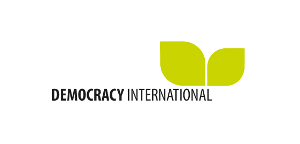 W
WDemocracy International e.V. is an international non-governmental organisation (NGO) working on strengthening direct democracy and citizens' participation at local level, in the nation states and on the global level. Democracy International has been existing as a loose network of democracy activists since 2002. The organisation was formally established in June 2011 as a registered membership association according to German non-profit law. Democracy International is politically independent and funded by membership fees and individual donations. The headquarters are in Cologne, Germany.
 W
W"Do not buy Russian goods!" or "Boycott Russian goods!" is a nonviolent resistance campaign to boycott Russian commerce in Ukraine. The protest started on 14 August 2013 as a reaction to a Russian Federation trade embargo against Ukraine. It was organized by Vidsich on social media. The campaign expanded to mass distribution of leaflets, posters, and stickers in over 45 cities and towns. Having faded by the beginning of the Euromaidan demonstrations in November 2013, it was renewed on 2 March 2014, during the Crimean crisis and the Russian military intervention in Ukraine.
 W
WThe European Citizens' Initiative (ECI) is a European Union (EU) mechanism aimed at increasing direct democracy by enabling "EU citizens to participate directly in the development of EU policies", introduced with the Treaty of Lisbon in 2007. The initiative enables one million citizens of the European Union, who are nationals of at least seven member states, to call directly on the European Commission to propose a legal act in an area where the member states have conferred powers onto the EU level. This right to request the Commission to initiate a legislative proposal puts citizens on the same footing as the European Parliament and the European Council, who enjoy this right according to Articles 225 and 241 TFEU, respectively. The Commission holds the right of initiative in the EU.{} The first registered ECI, Fraternité 2020, was initiated on 9 May 2012, although the first submitted ECI was One Single Tariff.
 W
WThe General Students Assembly is the supreme and sovereign body of the association of students in every university in Greece. It decides on every subject and exercises supervision and control over other institutions of the association. It is the supreme decision-making body of the Association, comprising all members of the club and take decisions by majority vote after an open debate on the issues. Every faculty has its own assembly, for example: General Student Assembly of the Faculty of History, General Student Assembly of the Faculty of Mathematics.
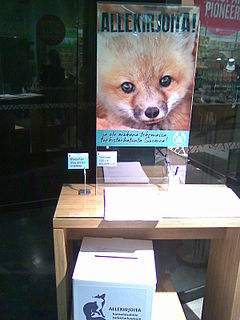 W
WIn political science, an initiative is a means by which a petition signed by a certain number of registered voters can force a government to choose either to enact a law or hold a public vote in the legislature in what is called indirect initiative, or under direct initiative, where the proposition is put to a plebiscite or referendum, in what is called a Popular initiated Referendum or citizen-initiated referendum.
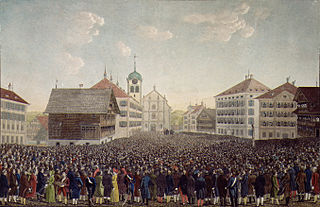 W
WThe Landsgemeinde or "cantonal assembly" is a public, non-secret ballot voting system operating by majority rule, which constitutes one of the oldest forms of direct democracy. Still at use – in a few places – at the subnational political level in Switzerland, it was formerly practiced in eight cantons. For practical reasons, the Landsgemeinde has been abolished at the cantonal level in all but two cantons where it still holds the highest political authority: Appenzell Innerrhoden and Glarus. The Landsgemeinde is also convened in some districts of Appenzell Innerrhoden, Grisons and Schwyz to vote on local questions.
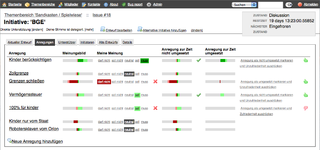 W
WLiquidFeedback is free software for political opinion formation and decision making, combining aspects of representative and direct democracy. Its most important feature is the implementation of a delegated voting system which is to establish a new form of political representation and participation that takes into account the knowledge disparity of its participants. The software offers much promise but also faces many threats.
 W
WPia Mancini is an activist and technical project leader from Argentina. She is co-founder of Democracy Earth and Open Collective. The latter is a project that facilitates open source code contributors to receive donations.
 W
WA popular referendum is a type of a referendum that provides a means by which a petition signed by a certain minimum number of registered voters can force a public vote (plebiscite) on an existing statute, constitutional amendment, charter amendment or ordinance, or, in its minimal form, to simply oblige the executive or legislative bodies to consider the subject by submitting it to the order of the day. It is a form of direct democracy.
 W
WThe Rojava conflict, also known as the Rojava revolution, is a political upheaval and military conflict taking place in northern Syria, known among Kurds as Western Kurdistan or Rojava.
 W
WA thing was a governing assembly in early Germanic society, made up of the free people of the community presided over by a lawspeaker. Things took place at regular intervals, usually at prominent places that were accessible by travel. They provided legislative functions, as well as being social events and opportunities for trade. In modern usage, the meaning of this word in English and other languages has shifted to mean not just an assemblage of some sort but simply any sort of thing.
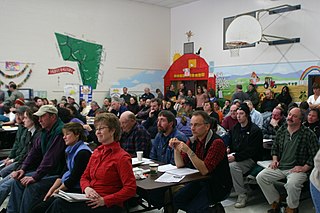 W
WA town meeting is a form of direct democracy in which most or all of the members of a community come together to legislate policy and budgets for local government. It is a town- or city-level meeting in which decisions are made, in contrast with town hall meetings held by state and national politicians to answer questions from their constituents, which have no decision-making power.